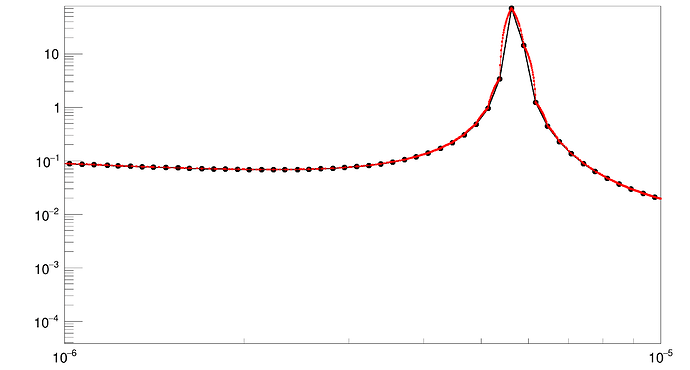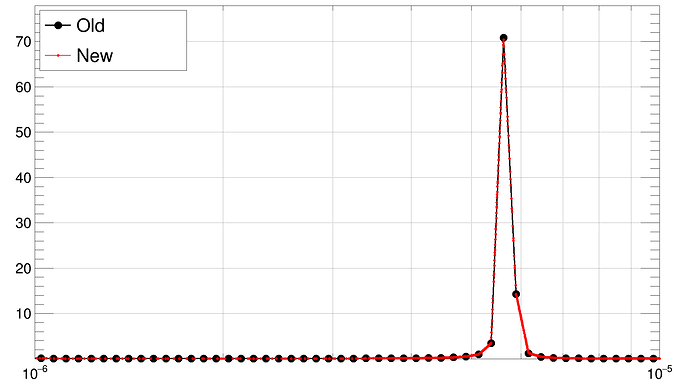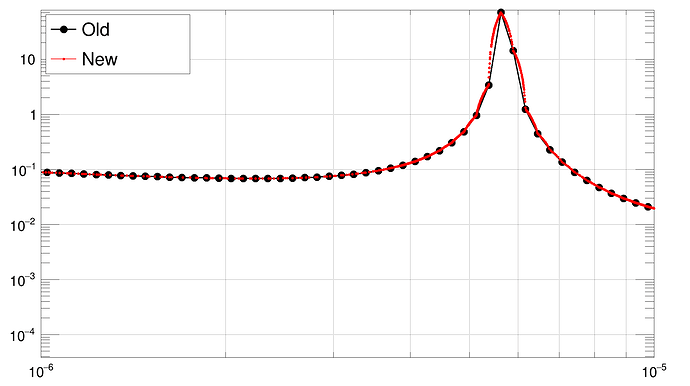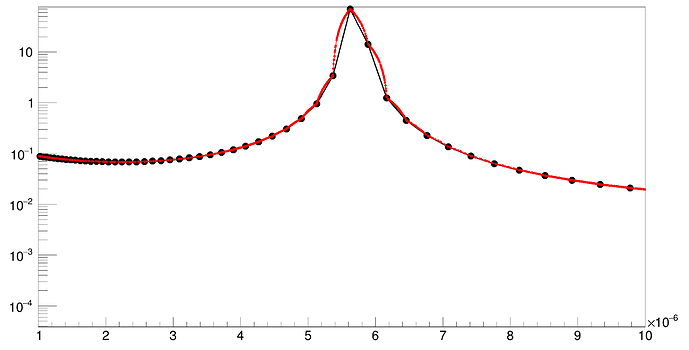ROOT Version: 6.18/04Platform: Ubuntu 18.04Compiler: gcc 7.5.0 (Ubuntu 7.5.0-3ubuntu1~18.04)
Dear co-rooters,
I’m facing an issue with TGraph::Eval(). I’m creating a TGraph from an ascii file and my goal is to change the x-axis grid (aka binning) of that TGraph. The new x-values are also read from another ascii file.
I thought the easiest way is to use TGraph::Eval and the TGraph TGraph(const char* filename, const char* format = "%lg %lg", Option_t* option = "") constructor, however the interpolation isn’t linear but it curves, as shown below in red line/points
My code is the following(I’m including the data files)
Thanks in advance!
#include "TGraph.h"
#include <Math/Interpolator.h>
#include <iostream>
#include <fstream>
#include <vector>
void interpolate(){
TGraph *g_ENDF = new TGraph("Hf_ENDF.dat", "%lg %lg");
TGraph *g_new = new TGraph("Hf_new.dat" , "%lg %lg");
g_ENDF->Sort();
g_new ->Sort();
// std::ifstream input("Hf_ENDF.dat");
// std::vector<double> EN, XS;
// int lines=0;
// double en, xs;
// while ( !input.eof() ){
// input >> en >> xs;
// EN.push_back(en);
// XS.push_back(xs);
// lines++;
// }
//
// TGraph *g_ENDF = new TGraph(lines, &EN[0], &XS[0]);
g_ENDF->Draw("APL");
g_ENDF->SetLineColor(kBlack);
g_ENDF->SetLineWidth(4);
//
// ROOT::Math::Interpolator inter (lines, ROOT::Math::Interpolation::kLINEAR);
// inter.SetData(lines, &EN[0], &XS[0]);
// std::ifstream input_new("Hf_new.dat");
// std::vector<double> EN_new, XS_new;
// int lines_new=0;
// double en_new, xs_new;
// while ( !input_new.eof() ){
// input_new >> en_new >> xs_new;
// EN_new.push_back(en_new);
// XS_new.push_back( inter.Eval( en_new ) );
// lines_new++;
// }
////
// TGraph *g_new = new TGraph(lines_new, &EN_new[0], &XS_new[0]);
g_new->SetLineColor(kRed);
g_new->SetLineWidth(2);
int n = g_new->GetN();
double *x = g_new->GetX();
double *y = g_new->GetY();
int n_endf = g_ENDF->GetN();
double *x_endf = g_ENDF->GetX();
double *y_endf = g_ENDF->GetY();
for (int i=0; i<n; ++i){
y[i] = g_ENDF->Eval( x[i] );
g_new->SetPoint(i, x[i], y[i]);
}
g_new->Draw("PLsame");
g_new->SetName("g_new");
//g_new->Print();
}
Interpolation.zip (149.1 KB)
couet
September 3, 2021, 6:27am
2
When I run the macro you posted I get an empty canvas.
See how Eval works. If it doesn’t do what you want, you need another way.
That’s bizarre… Maybe it doesn’t read the files properly?
Also, I’m first compiling it
.L interpolate.C++
and then executing it
interpolate()
TGraph::Eval is supposed to do a liner interpolation between points, right?Eval( x ) or Eval(x, 0, "").
It seems to be working nicely in flat areas, but when the y values rapidly change, I get this curvy behaviour…
I also tried with ROOT::Math::Interpolator and although I sorted my file using sort -k 1g Hf_ENDF.dat and checked for duplicates using awk 'a[$1]++{print $1}' Hf_ENDF.dat, the interpolator complains
Error in <GSLError>: Error 4 in interp.c at 83 : x values must be strictly increasing
Warning in <ROOT::Math::GSLInterpolator::Eval>: input domain error
Any idea on what might be wrong?
Thanks in advance!
The version of the code with the interpolator is:
#include "TGraph.h"
#include <Math/Interpolator.h>
#include <iostream>
#include <fstream>
#include <vector>
void interpolate(){
std::ifstream input("Hf_ENDF.dat");
std::vector<double> EN, XS;
int lines=0;
double en, xs;
while ( 1 ){
input >> en >> xs;
if( input.eof() ) break;
cout << en << ", " << xs << endl;
EN.push_back(en);
XS.push_back(xs);
lines++;
}
TGraph *g_ENDF = new TGraph(lines, &EN[0], &XS[0]);
g_ENDF->Draw("APL");
g_ENDF->SetLineColor(kBlack);
g_ENDF->SetLineWidth(4);
ROOT::Math::Interpolator inter (lines, ROOT::Math::Interpolation::kLINEAR);
inter.SetData(lines, &EN[0], &XS[0]);
cout << inter.Eval( 1.666e-1 ) << endl;
std::ifstream input_new("Hf_new.dat");
std::vector<double> EN_new, XS_new;
int lines_new=0;
double en_new, xs_new;
while ( !input_new.eof() ){
input_new >> en_new >> xs_new;
EN_new.push_back(en_new);
XS_new.push_back( inter.Eval( en_new ) );
lines_new++;
}
TGraph *g_new = new TGraph(lines_new, &EN_new[0], &XS_new[0]);
g_new->SetLineColor(kRed);
g_new->SetLineWidth(2);
g_new->Draw("PLsame");
g_new->SetName("g_new");
}
1 - Read the second file (HF_new.dat) in the same way you read the first one.
Thanks for your reply.
I’m re-attaching the files and the updated code.
#include "TH1D.h"
#include "TGraph.h"
#include <Math/Interpolator.h>
#include <iostream>
#include <fstream>
#include <vector>
void interpolate(){
double bin_content = 0.;
std::ifstream input_ENDF("Hf_ENDF.dat");
std::vector<double> EN_ENDF, XS_ENDF;
int lines_ENDF=0;
double en_ENDF, xs_ENDF;
while (1){
input_ENDF >> en_ENDF >> xs_ENDF;
if( input_ENDF.eof() ) break;
EN_ENDF.push_back(en_ENDF);
XS_ENDF.push_back(xs_ENDF);
lines_ENDF++;
}
TGraph *g_ENDF = new TGraph(lines_ENDF, &EN_ENDF[0], &XS_ENDF[0]);
g_ENDF->Draw("APL");
g_ENDF->SetLineColor(kBlack);
g_ENDF->SetLineWidth(4);
g_ENDF->GetXaxis()->SetLimits(1e-6, 1e-5);|
g_ENDF->SetMarkerStyle(20);|
g_ENDF->SetMarkerSize(3);|
ROOT::Math::Interpolator inter (lines_ENDF, ROOT::Math::Interpolation::kLINEAR);
inter.SetData(lines_ENDF, &EN_ENDF[0], &XS_ENDF[0]);
std::ifstream input_new("Hf_new_binning.dat");
std::vector<double> EN_new, XS_new;
int lines_new=0;
double en_new, xs_new;
while ( !input_new.eof() ){
input_new >> en_new >> xs_new;
if( input_new.eof() ) break;
EN_new.push_back(en_new);
bin_content = inter.Eval(en_new);
XS_new.push_back( bin_content );
lines_new++;
}
TGraph *g_new = new TGraph(lines_new, &EN_new[0], &XS_new[0]);
g_new->SetLineColor(kRed);
g_new->SetLineWidth(2);
g_new->Draw("Psame");
g_new->SetName("g_new");
g_new->SetMarkerColor(kRed);
g_new->SetMarkerStyle(20);
}
The thing is that it looks fine when the y-axis isn’t log. Is it maybe related?
Interpolation.zip (130.8 KB)
Thanks for the reply.TGraphs and setting the logy axis but still I see the"curvy" interpolation.
#include "TH1D.h"
#include "TGraph.h"
#include "TPad.h"
#include <Math/Interpolator.h>
#include <iostream>
#include <fstream>
#include <vector>
void interpolate(){
double bin_content = 0.;
std::ifstream input_ENDF("Hf_ENDF.dat");
std::vector<double> EN_ENDF, XS_ENDF;
int lines_ENDF=0;
double en_ENDF, xs_ENDF;
while (1){
input_ENDF >> en_ENDF >> xs_ENDF;
if( input_ENDF.eof() ) break;
EN_ENDF.push_back(en_ENDF);
XS_ENDF.push_back(xs_ENDF);
lines_ENDF++;
}
TGraph *g_ENDF = new TGraph(lines_ENDF);//, &EN_ENDF[0], &XS_ENDF[0]);
for(int i=0; i<lines_ENDF;++i){
g_ENDF->SetPoint(i, EN_ENDF[i], XS_ENDF[i]);
}
g_ENDF->Draw("AL*");
g_ENDF->SetLineColor(kBlack);
g_ENDF->SetLineWidth(4);
ROOT::Math::Interpolator inter (lines_ENDF, ROOT::Math::Interpolation::kLINEAR);
inter.SetData(lines_ENDF, &EN_ENDF[0], &XS_ENDF[0]);
std::ifstream input_new("Hf_new_binning.dat");
std::vector<double> EN_new, XS_new;
int lines_new=0;
double en_new, xs_new;
while ( !input_new.eof() ){
input_new >> en_new >> xs_new;
if( input_new.eof() ) break;
EN_new.push_back(en_new);
bin_content = inter.Eval(en_new);
XS_new.push_back( bin_content );
lines_new++;
}
TGraph *g_new = new TGraph(lines_new);//, &EN_new[0], &XS_new[0]);
for(int i=0; i<lines_new;++i){
g_new->SetPoint(i, EN_new[i], XS_new[i]);
}
g_new->SetLineColor(kRed);
g_new->SetLineWidth(2);
g_new->Draw("L*");
g_new->SetName("g_new");
g_ENDF->GetXaxis()->SetLimits(1e-6, 1e-5);
g_ENDF->SetMarkerStyle(20);
g_ENDF->SetMarkerSize(3);
g_new->SetMarkerColor(kRed);
g_new->SetMarkerStyle(20);
gPad->SetLogy(1);
}
{
TGraph *g10 = new TGraph(10);
for (int i = 1; i <= 10; i++) g10->SetPoint(i - 1, i, i);
g10->SetMarkerColor(kBlue); g10->SetLineColor(kBlue);
TGraph *g2 = new TGraph(2);
g2->SetPoint(0, 1., 1.); g2->SetPoint(1, 10., 10.);
g2->SetMarkerColor(kRed); g2->SetLineColor(kRed);
TCanvas *c = new TCanvas("c", "c");
c->Divide(2, 2);
c->cd(1);
g10->Draw("AL*"); g2->Draw("L*");
c->cd(2);
g10->Draw("AL*"); g2->Draw("L*"); gPad->SetLogx(1);
c->cd(3);
g10->Draw("AL*"); g2->Draw("L*"); gPad->SetLogy(1);
c->cd(4);
g10->Draw("AL*"); g2->Draw("L*"); gPad->SetLogx(1); gPad->SetLogy(1);
c->cd(0);
}
system
September 22, 2021, 7:14pm
12
This topic was automatically closed 14 days after the last reply. New replies are no longer allowed.



